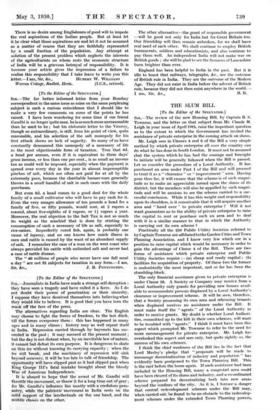[To the Editor of the SPECTATOR.] SIR,—Journalists in India have
made a strange self-deception: they have seen a tragedy and have called it a farce. As I do not doubt their power of penetration or their sincerity, I suppose they have deceived themselves into believing what they would like to believe. It is good that you have torn the mask off the face of the press.
The alternatives regarding India are clear. The English may choose to fight the forces of freedom, to the last ditch, -till the forces overpower them : this has happened in many ages' and in many climes ; history may as well repeat itself in India. Repression carried through by bayonets has sue-
ceded in the ; it may succeed at the present moment ; lint the day is not distant when, by an inevitable law of nature, it cannot btit defeat its own purpose. It is dangerous to skate on thin ice without knowing its earning capacity ; when the lee Will break, and the machinery of repression Will sink beyOnd recovery, it Will be too late to talk of friendship. The oPPOrtimity will have slipped past as it had slipped past when King George III's fatal mistake brought about the bloody War of American Independence. ' It is absurd to hope that the arrest of Mr. Gandhi will throttle the movement, or throw it for a long time outof gear ; for Mr. Gandhi's influence lies "mostly with a credulous peas- antry, While the patriotic movement in India rests on the solid support of the intellectuals On the one hand, and the middle classes on the other. The other alternative—the grant of responsible government —will be good not only for India but for Great Britain too. Our friendship will then remain unbroken, for we shall have real need of each other. We shall continue to employ British bureaucrats, soldiers and educationists, and also continue to pay them well. An independent India will not make war on British goods ; she will be glad to see the furnaces of Lancashire burn brighter than ever.
England has been helpful to India in the past. But it is idle to boast that railways, telegraphs, &c., are the outcome of British rule in India. They are the outcome of the Modern Age. They did not exist in India before the advent of British rule, because they did not then exist anywhere in the world.—














































 Previous page
Previous page